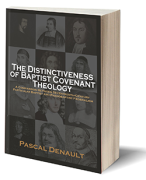Archive
Sandemanianism plague
We live in such a spiritual void in part created by those who act/believe that to just say the words (secular meaning of confess not Biblical confession) they are within their rights demanding to be believed and treated as one of God’s. We have millions of people who have mouthed a simple prayer who’s hearts, however, have shown no change. These victims of Satan’s schemes are blinded and deceived, becoming inoculated against the Holy Spirit.. We have the secular concept of repentance (say the words “I’m sorry”,) and all is well and restored. This intellectualism and rationalism thinking spiritually destroys millions…
“but declared both to them of Damascus first and at Jerusalem, and throughout all the country of Judaea, and also to the Gentiles, that they should repent and turn to God, doing works worthy of repentance.” Acts 26:20
So we offer you Dr. Martyn Lloyd-Jones thoughts…
Read the entire article here.
Sandemanianism
by Michael Haykin
Andrew Fuller and the Sandemanians
In December 1967, Dr Martyn Lloyd-Jones gave an address to what was then known as the Puritan Conference on the topic of ‘Sandemanianism’. Our initial reaction might be that the topic is esoteric, of little interest or value to modern men and women. But we would not feel this way if we were well-versed in the history of eighteenth-century Evangelicalism, the womb from which this particular doctrinal viewpoint came forth. Dr Lloyd-Jones proceeded to show that this theological aberration is of paramount importance for our own day. This article seeks to explore some aspects of the long-forgotten Sandemanian controversy.
Sandemanianism and the nature of saving faith
The roots of Sandemanianism lie in the 1720s when John Glas (1695-1773), minister of the Church of Scotland work in Tealing, Scotland, and a man of considerable erudition, gradually came to the conviction that Christ’s kingdom is one that is completely spiritual and, as such, independent of both state control and support. A church of some seventy believers was formed in the parish of Tealing, and over the next couple of decades ‘Glasite’ congregations could be found in Dundee, Perth, Edinburgh and booming textile centres such as Paisley and Dunkeld. Although the Glasites were never numerous, Glas’ views exerted wide influence throughout the British Isles and America, especially through the travels and writings of his son-in-law Robert Sandeman (1718-1771), whom Lloyd-Jones rightly describes as ‘a born controversialist’. In addition to adopting such practices as foot-washing, holy kissing, the use of lots to determine God’s will, and an insistence on unanimity in all church decisions, Glas’ and Sandeman’s followers also distinguished themselves from other eighteenth-century Evangelicals by a predominantly intellectualist view of faith. They became known for their cardinal theological tenet that saving faith is ‘bare belief of the bare truth’.
Read the entire article here.
A Brief Clarification of Calvinism, Arminianism & Hyper-Calvinism
by Tom Ascol
D. Martyn Lloyd-Jones once observed that “the ignorant Arminian does not know the difference between Calvinism and hyper-Calvinism.” The good news is that not all Arminians are ignorant. The bad news, however, is that such ignorance is not limited to Arminians.
Throughout evangelical history, where evangelical Calvinism as spread among Bible believing Christians, charges of hyper-Calvinism inevitably arise from those who do not know the difference. That pattern is being repeated today both within and beyond the borders of the Southern Baptist Convention. Examples of such careless accusations are not hard to find.
Read the entire article here.
The Problem with Polemical Preaching
Here is an interesting article found at the Gospel Coalition Website. Many today believe that the minister’s main job is to call out every false concept found in the ministries of other men. While we are to defend truth, nonetheless many build their entire ministries around this concept. I have visited blogs and websites that do nothing but expose the errors and false doctrines of groups or other ministers. Yet these websites never give a proper presentation of the gospel themselves. God has not only called us to refute error, but also to feed his sheep. This ‘feeding of the sheep’ occurs when we present the truth of God’s Word by giving a proper presentation of what the scriptures teach concerning the gospel and the doctrines that we as Christians ought to believe and live by.
There are many ways to impair a sermon and muffle a ministry. Unsuspecting pastors have been doing it for centuries. One such way is by means of polemics. Polemics, strictly speaking, is a strongly written or verbal argument against another position. Polemical preaching then would be a sermon that goes after a particular practice or doctrine held by another person or institution.
Martyn Lloyd-Jones called polemical preaching “thorny.” On the one hand, preachers can go wrong by being too weak, not adequately refuting the error of those who contradict sound doctrine (Titus 1:9, 2:15). On the other hand a preacher can become consumed with calling everyone and everything out. We now have ministries, churches, even websites that seem to build their identity on their reaction to error. After all, we live in a time that some have called the most undiscerning period in history, which means some preachers will undertake polemical preaching and ministry. But defending truth against error is only one part of faithful preaching. The question is not whether there is a place for polemical preaching but whether someone can do too much of it.
Read the entire article here.












Recent Comments